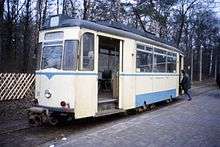Berlin-Rahnsdorf station
| Through station | |||||||||||
|
Entrance building | |||||||||||
| Location |
Rahnsdorf, Treptow-Köpenick, Berlin Germany | ||||||||||
| Coordinates | 52°27′6″N 13°41′23″E / 52.45167°N 13.68972°ECoordinates: 52°27′6″N 13°41′23″E / 52.45167°N 13.68972°E | ||||||||||
| Line(s) |
| ||||||||||
| Platforms | 2 | ||||||||||
| Construction | |||||||||||
| Architect |
| ||||||||||
| Other information | |||||||||||
| Station code | 5100 | ||||||||||
| DS100 code | BRD[1] | ||||||||||
| IBNR | 8089082 | ||||||||||
| Category | 5[2] | ||||||||||
| History | |||||||||||
| Opened | 15 May 1879 | ||||||||||
| Services | |||||||||||
| |||||||||||
Rahnsdorf station is a station of the Berlin S-Bahn. It is located in the district of Rahnsdorf in the Berlin district of Treptow-Köpenick.
History

The station was opened on 15 May 1879. The station was rebuilt to a design by the architects Charles Cornelius and Waldemar Suadicani between 1899 and 1902. This work was made necessary by the elevation of the tracks and the simultaneous construction of a separate pair of tracks for long-distance and freight traffic. The original construction of the station area is still largely preserved and the station building is heritage-listed.[3]
There was a serious railway accident on 11 November 1916: a group of track maintenance workers made up of women—because of labour shortages as a result of the First World War—waved to the soldiers of a passing military train. Because of poor visibility due to fog, they did not hear a warning—that was given too late—of a train approaching on the track on which they stood. 19 women were killed. The look-out person was convicted and sent to prison for one year.[4][5]
Electric suburban trains have stopped at the station since 11 June 1928; since 1 December 1930 they have been branded as S-Bahn services. Some steam-hauled services continued for about half a year and they ended in 1929.
Train services ended in April 1945 due to the war. After the Second World War, the Soviet occupation administration dismantled both S-Bahn tracks. The line, including the station, was returned to operation on 1 September 1948. The station was the terminus until 2 November 1948, since the line had not been restored to Erkner.
In 2009 and 2010, the platform canopy was restored, the lighting was renewed and tactile paving was installed.
Impact on the surrounding area
The station is away from major settlements, but it has influenced the development of the surrounding villages. In particular Schoeneiche has extended, with the area of Fichtenau developeing towards the station to produce a "nose".
Passenger services
The station is served by Berlin S-Bahn line S3 between Erkner and Ostkreuz. In addition, the station is served by bus route 161, which is operated by the Berliner Verkehrsbetriebe, and is the starting point of the Woltersdorf tramway (tramline 87 of the Verkehrsverbund Berlin-Brandenburg).
| Service | Route |
|---|---|
| |
Ostkreuz – Rummelsburg – Betriebsbahnhof Rummelsburg – Karlshorst – Wuhlheide – Köpenick – Hirschgarten – Friedrichshagen – Rahnsdorf – Wilhelmshagen – Erkner |
Notes
- ↑ Eisenbahnatlas Deutschland (German railway atlas) (2009/2010 ed.). Schweers + Wall. 2009. ISBN 978-3-89494-139-0.
- ↑ "Stationspreisliste 2016" [Station price list 2016] (PDF) (in German). DB Station&Service. 1 December 2015. Retrieved 24 January 2016.
- ↑ "Berlin heritage list: S-Bahnhof Rahnsdorf" (in German). Berlin government. Retrieved 27 November 2014.
- ↑ Hans Joachim Ritzau (1979). Eisenbahn-Katastrophen in Deutschland. Splitter deutscher Geschichte (in German) 1. Landsberg-Pürgen. p. 102.
- ↑ Ludwig Stockert. Eisenbahnunfälle (Neue Folge) – Ein weiterer Beitrag zur Eisenbahnbetriebslehre (in German) (Berlin 1920) (188). Missing or empty
|title=(help)
External links
| Wikimedia Commons has media related to Berlin-Rahnsdorf station. |
- "Rahnsdorf" (in German). Stadtschnellbahn Berlin. Retrieved 27 November 2014.
- (German) Rahnsdorf station's page on S-Bahn website